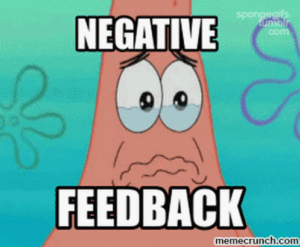
Importance of feedback
Do not throw away all work & performance related feedback, just because it feels uncomfortable.
It’s said that one should take feedback from people who love and cherish us. Now, our loved ones may often see only the good stuff, which is great, because we all need people who cheer us in our lives. However, they may not be very objective when it comes to our shortcomings. If you’ve seen the movie, Florence Foster Jenkins, you’ll know what I’m talking about. In the movie, Florence wants to resume singing and her long time companion encourages her despite knowing how terrible she is at singing, ending with funny yet disastrous consequences.

When critical feedback comes from people in our work or social settings, we may want to discard it without realising that it can be a great opportunity, albeit uncomfortable one, to grow.
I’m not talking about rude or disrespectful comments , moral judgments and other forms of destructive comments that people make under the garb of feedback.
I’m talking about constructive feedback which may bring up defensiveness in you and make you uncomfortable, but ‘can be’ really helpful in your growth.
In order to discern whether the feedback will serve you or not, try this:
1. Untie the feedback from your self worth. The feedback is about your work, not you. If there’s a mistake that’s been pointed out, it’s about your work, not about you. In REBT we use the term ‘self-downing’ for putting our whole self down instead of looking at the behaviour that may need a change.
2. Distinguish realistic feedback from unrealistic feedback. It’s not your job to fulfill everyone’s unrealistic expectations, camouflaged as feedback. It’s one thing to try to do better, it’s quite another to start people pleasing by fulfilling unrealistic expectations of others.
3. Discern if the feedback is going to help you grow or is it putting unnecessary pressure on you, which in the long run isn’t really helpful.
4. Is the feedback kind or unkind? Discard unkind feedback, especially the ones that feels like an attack, and only take the feedback that is kind and constructive in nature.
5. In all this, tapping on defensiveness, hurt and anger will help. Once all these feelings subside, you’ll be able to separate gold from garbage (feedback).
We must remember that we can only do our best based on what we know in a given moment, and that it’s okay to make mistakes. Perfection is an illusion. What really helps is doing our best and making an effort, learning from imperfections and building our strengths. Constructive and compassionate feedback from others can be very helpful to become aware of our blind spots.

Write a Comment